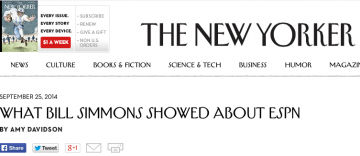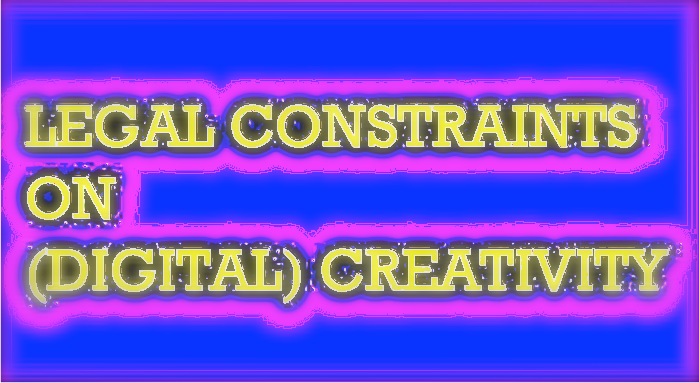
Four questions for future class discussion: 1. Is what Simmons said defamatory? 2. If Goodell doesn’t sue should ESPN take action? 3. If “sports journalism” is legitimate journalism, would not ESPN be backing Simmons up? 4. How do conflicts of interest (broadcast rights deals) in the sports world play into this?
Read the story and react below: What Bill Simmons Showed About ESPN – The New Yorker.
jon

 Legal Constraints on (Digital) Creativity
Legal Constraints on (Digital) Creativity
This article highlights important issues within sports journalism and sports culture in general. Machismo and violence has been a negative component of sports culture that has gone unchecked for far too long. Ray Rice is just one of many professional athletes that has been involved in cases of violence.
Sports journalism is legitimate journalism as there are many talented journalists in this field that produce great work. It is also a very profitable industry with many fans consuming sports media. However preventing journalists from reporting honestly about issues due to conflict of interest, undermines this legitimacy.
It is not only sports focused news platforms that have failed to take issues in the sports world seriously. For example CNN coverage of the Stubenville rape case was criticized for focusing on sympathy for the perpetrators rather than the seriousness of the crime, the impact on the survivor, or the rape culture in sports that encouraged this behaviour. In effect CNN’s reporting, rather than holding people to account, further contributed to the problem.
I do not consider what Bills Simmons said to be defamatory. Goodell is a public figure and the fact that he has lied in relation to the Ray Rice case is public knowledge. Simmons was not attacking his character but asserting that he believes Goodell lied in this case. ESPN did not back Simmons up due to conflict of interest rather than concerns over defamation, and it seems that he was aware what he said would not be supported. News platforms need to be free from conflict of interest to be able to support journalistic integrity.
I agree with you. That said would what Simmons said pass muster under Canadian law? Stay tuned for this weeks class and then let’s talk more….
jon
I don’t think what Simmons said is defamatory (under Canadian law) because it falls under Fair Comment — what he said isn’t outlandishly crazy, and I think a majority of his audience would share Simmons’ belief that Goodell is a “liar” (i.e. this is more than simply gossip).
Sports journalism is legitimate journalism, and part of the problem is that it isn’t being treated as such in this particular instance (and certainly others). Viewing it as lesser only corroborates the idea that sports journalists don’t have a rightful platform to contribute to responsible/meaningful conversation, which is what Simmons was doing: he was frustrated with Goodell’s inane comments to the public on the Rice video, so Simmons said something to the public about it. His program is called “The B.S. Report.” Would a reasonable person expect conversations about the ethics of restrictive breeding of race horses accompanied by background symphony orchestra?
Did it add to the conversation? Was it necessary? Simmons as a journalist clearly thought yes to both, and ESPN should have supported him in his capacity as such. But I guess having a contract-fed Scrooge McDuck sized money pool to play in trumps journalistic integrity for ESPN. So this isn’t just the fault of the public treating sports as lesser/non-journalism, but of the networks themselves for belittling the value of their reporters.
This is my own (subjective) opinion. However, this did occur in the US where defamation law varies by state and the defense of Fair Comment is perhaps even more subjectively scrutinized as a result. The other factor is actual malice (i.e. could Simmons prove that Goodell is a liar?) Regardless of where it took place, this is an illustrative example of the interplay and tensions between the law, media, and lucrative business deals.
Exactly right Codi. It’s a case study in the tensions.
I agree that sports journalism is journalism. Rather I believe it should be. But the relationship with the teams and the leagues have to be seen as subject to journalism – not the other way around. That said I have no always felt that all sports reporters see themselves as hardcore journalists. My point is they should. If they don’t believe they are no one else will believe it either.
jon
I am reminded of the recent viral video of a little boy and girl arguing about whether it was “waining” (raining) or “spwankling” (sprinkling). The little boy became very frustrated with his opponent and shouted out “You’re not real! I’m real”. Not defamation – the girl is real. Simmons calling Goodell a liar – not defamation. Goodell understands what was on the tape, even if he didn’t “see” it. If he can’t understand what a knockout punch looks like, delivered and received, he does not have any literal cranial capacity.
However, if Goodell sued ESPN and/or Simmons, could they actually prove with hard, indisputable evidence that Goodell lied about not knowing what was on the tape? Devil’s advocate stance: what if Goodell didn’t know that Rice knocked his fiancee-now-wife unconscious, or that he dragged her inert body out of the elevator? What if he just knew that there was a physical altercation causing bodily harm?
I feel like in Canada this is a definite, no case for defamation situation. Like Codi said, Simmons called Goodell a liar, not a misogynist who condones physical violence towards women. Nothing crazy here. But, in the U.S., perhaps it’s different and more complex, what with the legal independence of the separate states.
What about Sam Smith, who said women should be careful how they deal with their men, only receiving a week’s suspension from ESPN? And nothing else. No discipline. No controversy. No, let’s say, firing? But, no money was involved there. Just hate speech (freedom of speech?).